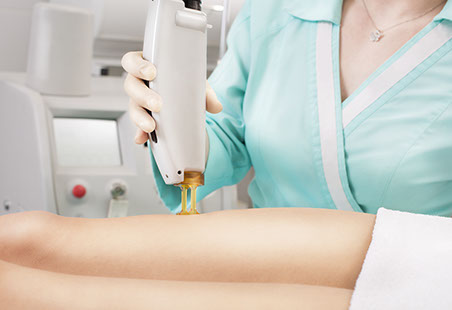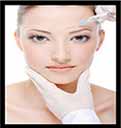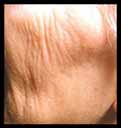Laser Hair Removal
Glossary
Laser Hair Removal Glossary
To easily search the Laser Hair Removal Glossary for a specific word hold Control + F key and type in your text.
Anti-androgenic
(medicines that inhibit hair growth) spironolactone, Euflex, Androcur, and Vaniqa cream. These medicines might slightly reduce the pigment in hair roots and make laser treatment less efficient. The effects of these medications are temporary.
Bikini Line
This phrase describes the amount of pubic hair that you want to be removed around the outside or bottoms of your bathing suit or bikini.
Brazilian Hair Removal
Brazilian laser treatment is comprised of the entire area of pubic hair. You can choose to leave a strip of hair if you want.
Care Credit
A form of credit payment used often for cosmetic services.
Chromophore
Primary that most lasers target is melanin. Lasers for Hair removal selectively target 1 of 3 chromophores:
Melanin naturally occurs (actually gives our skin and hair color). The two types of melanin in the hair are pheomelanin (gives a blonde or red color to hair) or eumelanin (gives brown or black hair color).
Carbon can be introduced following waxing.
Hemoglobin occurs naturally in our blood (gives red color).
Cooling (as it pertains to the skin or Epidermas)
It creates more fluencies and reduces your side-effects and pain. There are 4 versions of epidermal cooling that can be used: Cryogen spray, Contact Cooling, Air Cooling, and Clear Gel.
4 main types of cooling have been developed:
Air cooling method
Chilled gel (clear) on the skin or by applying a cold compress beforehand
Chilled Tip / Contact cooling – through a window of chilled circulating water
Cryogen spritzer/spray – delivered immediately after the laser pulse
Crystal
Can be mined from the earth or rarely imitations can be created synthetically. As they pertain to the laser industry. Sapphire – Ruby Red Laser & Nd Yag laser are two crystalline materials used a lasers source.
Day Spa
A facility that provides relaxing, pampering, exfoliation cosmetic services. Can be connected with medical spas, hotels, gyms, health clubs, etc. Services can last anywhere from one hour to an entire day.
Depilatory Creams (Nair/Veet)
Chemicals that temporarily remove hair by dissolving.
Dermis
The Dermis is the skin’s second layer beneath the epidermis, located above subcutaneous fat. The Dermis is comprised of hair follicles, collagen, sweat glands, lymph vessels, elastic fibers, blood vessels, and fibroblasts. The dermis is responsible for the mechanical tightness of our skin and it is the place where our hair grows from
Destination Spa
A company that focuses exclusively on health enhancement, self-renewal, aesthetic and lifestyle improvements.
Diode Laser
Lumenis lightsheer is also known as the “Cadillac” of hair reduction. It can also be used for age spots, brown spots or laser other blemish removals. It’s also the primary laser for hair removal for skin types 3 – 5.
Electrolysis
In addition to the permanent removal of unwanted hair, Electrolysis prevents ingrown hair and makes the skin feel smoother because it treats each hair follicle, individually.
Epidermis
The top layer of skin that protects Dermis. It’s made of mostly squamous cells and also keratinocytes, basal cells & melanocytes.
Erythema
Red skin caused by capillary dilation, which is usually a temporary side effect of laser hair removal.
Exfoliation
A procedure that can either be used to remove ingrown hair, cysts or just the top layer of dead skin cells off of the face or body. Typically medical spas exfoliate with Ultrasound skin scrubbers, Microneedling, Peels, Microdermabrasion or Scrubs with sugar, salt, grape or clay.
Female Facial Hair
One statistic shows that in the US alone, 42 percent of women remove undesirable facial hair every 6 months. This can be either hereditary or as a side effect of “hirsutism.”
Fluence
A significant consideration in Energy level, that is measured in Joules.
Hair Follicles
Tunnels of cells located in the Dermis. Hair is created by clumping these cells together. These tunnels of cells are disarmed without any side effects during the process of laser hair removal.
Hair Removal Cream (depilatories)
A cream or solution product for the purpose of removing unsightly body hair.
Herpes Simplex virus I or II
If hair removal is in the area of previous outbreaks, it is possible that the heat from the laser will cause a flare-up of the herpes virus, so they will need to take prescription antiviral medication for several days both before and after the treatment. If an outbreak is active it is important to reschedule.
Hirsutism
Medical terminology for extreme body hair which can be an indication of an underlying medical ailment. Such conditions are generally hormone-related, e.g. polycystic ovarian syndrome. The first port of call, if you have excessive body hair, should be to your General Practitioner, to discuss the problem and rule out any underlying health problems, which could be causing problems, such as female facial hair (usually around the mustache or beard area) that grows like men’s hair pattern. There are a lot of factors that contribute (genetics, hormones)
Hormone Replacement Therapy
Medications that contain one or more of the female hormones, usually estrogen and are used to treat women with symptoms pertaining to amenorrhoea, hysterectomy, osteoporosis, menopause, or signs of aging.
Hyperpigmentation
A common skin condition where patches of skin that appear darker in color than the surrounding skin. It can be caused by medications, genetics, scarring but usually, it is excess sun exposure.
Hypopigmentation
Loss of skin color in areas of skin that look like they are lacking pigment; can be caused by surgery, sun damage (even a delayed result years later), burns or skin cancer. It is caused by melanocyte and melanin depletion.
Hypotrichosis
The condition in which a person has abnormal hair patterns, usually hair loss or reduction. It usually occurs when vellus hair grows as opposed to terminal hair.
Joule (J/cm2)
Energy unit that describes the rate of the delivery of energy. (watt/second)
Laser
A focused intense light/radiation beam. The laser is an optical cavity composed of crystals, liquids, glass, dye, or gas with mirrors on the edges. They work in ultraviolet, infrared, and visible areas of the optical spectrum. We use two different types of lasers: the continuous wave lasers (create continuous light beams) and pulsed lasers (create light in short pulses).
Laser Hair Removal Glossary
Laser Attachments
Accessories for lasers including Q-switches and optical components that are used for control treatment levels and energy.
Laser Circles
These are blemishes that can appear on treating tan skin (or bronzers) with lasers. If your skin is too tanned, we may have to wait until the tan fades to avoid the development of laser circles or reduce the risk of burned skin.
Laser Cosmetic Enhancement
Nonsurgical and noninvasive use of lasers to remove pigmentation, birthmarks, freckles, wrinkles, fine lines, crows feet, sun and age spots, spider and varicose veins, to restore and smooth undesirable skin.
Using lasers to remove unwanted hair by stopping the hair-producing activity beneath the skin (on the hair follicle). Today, laser hair removal is the most popular and painless way to remove unwanted hair almost anywhere on the body.
Laser Pulse
The eruption of laser energy that achieves the power to perform the desired result.
Micro-needling
Is a simple, safe, effective procedure of hollow or small solid needles that cause controlled therapeutic holes for skin rejuvenation and a growing list of applications.
Melanin Pigment
A substance or pigment that gives color to the skin, which is created by organic epidermal cells or “melanocytes.” Moles and darker skin tones have more melanin in them.
Melanocytes
Specific epidermal cells that create melanin liable for the amount of color in your freckles, moles, birthmarks, and overall skin. The lighter your skin, the less melanin; the darker your skin, the more melanin.
Multiple treatments
Countless researches have proven that multiple treatments are more efficient and better for long term hair removal. Researchers suggest that patients spread their treatments out four to six weeks apart.
Nd Yag Laser
Solid lasers act as a medium to create 1064 nm wavelength. Yttrium Aluminum Garnet (named from Neodymium) is a synthetic crystal.
Perifollicular Edema
Swelling caused by fluid assembling in the area where the hair begins to grow. Although rare, it can be a mild, short-term side effect of Laser Hair Removal. It usually disperses within a few hours.
Photodynamic Therapy (PDT)
Treatment using photosensitizing drugs and light therapy to kill cells. Also known as phototherapy, photoradiation, or photochemotherapy. Used to treat acne.
Medications that can cause a reaction that is similar to a sunburn. Photosensitivity (sun sensitivity) is the inflammation of the skin activated by sunlight or medications. It causes redness which may look like a sunburn.
Pseudo Folliculitis Barbae
Getting laser hair reduction can help this uncomfortable inflammation that you may experience from shaving. More commonly known as razor bumps, they usually appear on the face for men and legs for women. The pain is more severe on the face because of the sensitivity of the area. Many people who experience this condition resort to laser hair removal for a more permanent fix.
Pulse Duration or Pulse Length
The total time energy is delivered from a laser (fraction of second). Measured in milliseconds, nanoseconds or microseconds, it’s the time in which the pulsed/diode laser is turned on.
Pulse Frequency (Hertz “Hz.”)
Speed/Rate that laser pulses are achieved. Communicated through pulses per fraction of a second and treats many hairs at once,
Pulse width
It is an important consideration and has been researched that longer pulse width can be more effective with fewer side effects for dark skin tones/types.
Razor bumps
Resulted from shaving, razor bumps occur from inflammation of hair follicles. See
“Pseudofolliculitis Barbae.”
Relaxation time
The specific delay between laser pulses after 2-3 pulses have been shot at the same target.
Repetition rate
The number of pulses per second by a Diode/Q-switch laser, has a cumulative effect, based on thermal relaxation time. Timing 1-3 pulses at the same target, with a specific delay, can cause improved results in treating the area.
Dermal filler based on hyaluronic acid that removes facial wrinkles and adds volume to lips or cheeks. Restylane Silk, Restylane Lyft are similar products with different thicknesses.
Ruby Laser
One of the first lasers used sapphire crystals with small amounts of chromium oxide.
Sculptra
A non-surgical, natural treatment to restore collagen, or lost volume with age to create a younger look. Sculptra is a substance that occurs naturally in the body, it is fully absorbed and no occurrence of allergic reaction has been reported.
Short term condition
A condition that can last a short time period usually goes away on its own.
Spot size
The spot size or laser beam width affects the success of the procedure. It’s said that the best beam is approximately 4 times as wide as the target area.
We have MANY options to choose from, so our Lasers can have a square, rectangle, or round spot size (to BEST CONTOUR to the sensitive areas we treat).
Sublative
Fractionated (or fractional) bi-polar radio frequency technology that places heat energy effectively into the upper dermis with minimal epidermal disruption, where it produces significant increased elastin and collagen.
Sublime
Treatment consists of elōs combination of effective levels of bi-polar radio frequency, laser, infrared, and visible light energies to reach deep dermal layers of skin and stimulate collagen growth.
Tanning products (or fake tanning products)
Such as self-tanners, bronzers, or other makeup (foundation) on the area to be treated can cause burning.
Terminal hair
Pigmented, long, unwanted hairs that are found on the arms, legs, torso, scalp, pubic region, beard, face, and underarms. For example, women may have coarse hair on their face, or men may have dark hair on their chest. The timing of treatment is important because of the 3 stages of hair growth, it works best when they are in this stage.
Tria or No No laser hair removal
An FDA approved, low-powered laser for hair removal made for home use. This device can only be used on large areas and takes an ample amount of time.
Vaniqa
The cream that’s prescribed to women to slow down the growth of facial hair. We do not suggest this method as laser hair removal is quicker and a permanent solution.
Vellus hair
Hair that is soft, short, fine, and non-colored “peach fuzz” which cannot be treated well by lasers.
Yag 1064nm Laser
A laser used for dark brown and black thick hair and is the most preferred laser wavelength for darker skin types.
Waxing
Hair removal process involves the application of warm wax with a strip of cloth, then quickly removed from the skin to remove unwanted hair.













